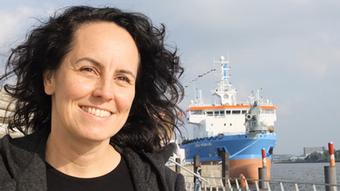I HAD TO LEAVE BRAZIL TO REALIZE MY POTENTIAL
Many people dream of living two lives in two different worlds, but few ever really do it. Ethnologist Eliane Fernandes commutes between the Old World and the New. Her studies and professional career in Germany have allowed her to live out her nomadic streak.

Eliane Fernandes Ferreira comes from a respectable middle-class background. Her father was a local official; her mother has been a school teacher for over forty years. Eliane Fernandes wanted to go to college and then see the world, but the universities of the megalopolis São Paulo were expensive – and they still are. In the end, love found a way, and she decided to try her luck in Germany. The love for the beau passed, but a love for the cool north remained: “The people here are just the way I like them. They may be more serious than in the Rhineland, but they’re warmhearted. That bears a certain resemblance to the culture of my home region, Minas Gerais – this reserve. I think this Hanseatic reserve suits me.”
Living in Three Worlds
Only in Germany could she blossom, Eliane Fernandes explains. She studied here and later married and had children – twins. Her mother and brothers live on the other side of an ocean, specifically, in the city Poços de Caldas in southeastern Brazil. For a number of years now, Eliane Fernandes has been traveling to Marechal Thaumaturgo to do research in the rain forest. The people there have now become fast friends – almost another family to her. Eliane Fernandes’ life in these three worlds began with her studies of ethnology, ancient and prehistory and journalism in Hamburg in the early 1990s.
Rain Forest 2.0
After she earned her degree, Eliane Fernandes embarked on her scientific career in Germany. She wrote her doctor’s thesis under the title “From a Bow and Arrow to the ‘Digital Bow’ – the Indigenous Peoples of Brazil and the Internet“, for which she first began doing research in the Marechal Thaumaturgo region in the state of Acre. It isn’t easy for different ethnic groups with differing self-images and conceptions of their environment to live side by side in the rain forest. To complicate matters, the region is listed at the very bottom of Brazil’s development index. The indigenous groups, in particular, quite often have to put up with the patronization of the majority social group. Contrary to the assertion that the internet might pose a threat to the culture of indigenous peoples, Eliane Fernandes says, “Processes of modernization are just as much a part of the life of indigenous communities and individuals as they are part of daily life for the rest of society.”
From the Digital Bow to Environmental Ethnology
At present, Eliane Fernandes Ferreira is researching the indigenous peoples’ different relationships to nature. Of particular relevance to her work is the way of life of the Ashaninka Indians. In her reports, we learn that, for many years Marechal Thaumaturgo served as a hub for caoutchouc tappers. By chance, Eliane Fernandes herself is a great-granddaughter of a caoutchouc baron, who, like many others, settled in this region in the late 19th century. As a little girl, Eliane Fernandes would listen to stories of her great-grandfather’s encounters with the indigenous people. She loves this land and remains ever vigilant for something that might have been lost to colonization and colonialism – something like a way of life in harmony with nature. In Acre’s Amazon basin, she’s found it. Indigenous groups here are fighting to preserve the rain forest. The Ashaninka have built a training center near the city of Marechal Thaumaturgo to share sustainable forms of forestry, beekeeping and fish breeding with other local inhabitants and present alternatives to conventional ranching and farming. Eliane Fernandes says this is essential – there’s little point in just talking about environmental problems without offering local people alternatives that could improve their economic situation. Her scientific work also exposes the distinction between the evil exploiters and the good protectors of the environment as a fallacy that in most cases does not reflect reality. The problems are rather to be found in a lack of alternatives in the form of sustainable livelihoods, in certain constellations of groups, in a still unmet need for educational campaigns and not least in misguided political decisions.
The ethnological Gypsy
Family, home and work in both Brazil and Germany are continuously intertwining aspects of Eliane Fernandes Ferreira’s life. Even so, she confides, it’s not always easy to live in three different worlds. Her occupation as an ethnologist and her passion for traveling are certainly helpful. “I’m a curious person who really likes to travel. I love traveling! I want to experience the whole world. I think I have a gypsy’s heart!”